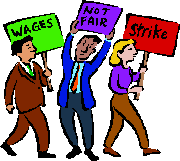End the Auto Crisis: Build Mass Transit
Public Ownership to Save Jobs and the Environment
Union auto workers are fighting for their lives. For us the fight to defend the United Auto Workers union (UAW) and its members is immediate. It is estimated that over three million jobs are linked to the jobs at GM, Ford and Chrysler: including workers in parts supply, dealerships, steel, rubber, and many other supporting industries. Bankruptcy would have devastating effects on communities where these workers live. Whole regions rely on their purchasing power and the loss of taxes for local and state governments would cause an even bigger crisis. Bankruptcy will also destroy the pensions and healthcare for millions of retirees.
We join with labor and all its allies in demanding immediate action by the federal government to guarantee the loans needed to save these jobs. We are actively engaged in the growing fight to build solidarity and support for the burning demands of the workers and their union.
Even if/when bridge loans are given to the Big Three, the companies have announced there will be further plant closings and say they will permanently shed tens of thousands of their workforce. They do this while continuing to move production out of the country. GM has manufacturing operations in 32 countries around the world. And while the auto companies complain about competition from lower wage countries, they in turn threaten workers in Mexico, Thailand, South America and elsewhere to accept low wages as a condition of work.
Everything unions have fought for throughout our history is being challenged. Republican senators are demanding that unionized workers tear-up their union contracts and work for non-union rates. A forced bankruptcy would destroy the contracts of the UAW. Automotive jobs have been a pathway to a better life for all working people and their loss would hit African American and Latino workers particularly hard. Black workers in particular are more concentrated in auto than other industries.
To solve the economic crisis we need to put more money, not less, into the hands of working people. Republican attempts to force the UAW to take cuts will increase the wage gap; it is a continuation of Republican trickledown economics that voters rejected in the November election. These are the same economic policies that created the present economic crisis. It would lower the purchasing power of auto workers and would create a downward wage pressure on all workers
If we agree that the auto industry is too important to fail, both in terms of our nation’s transportation needs and the need to move away from reliance on fossil fuels, then it is too important to be left in the hands of the CEO’s.
And at the same time, given the overall economic crisis and the underlying failures of unbridled corporate greed and mismanagement, it is the time to look at more basic solutions also. Demands for public and government oversight raise the issue of democratic public ownership of the domestic auto industry.
The United States government could buy all the common shares of stock in General Motors for less than $3 billion. The worth of the companies is less than the aid they want from taxpayers. If the public provides the capital, why do decisions remain in private hands? Representatives from the unions, from engineers employed in the industry, from government, and the communities and states where the plants are located, are best able to make the key decisions. Representatives from management itself should have input but not control.
We have an economic crisis, but we also have a crisis of the environment and the two are interlinked. We face global catastrophe and the profits before nature philosophy of the auto executives is a major roadblock for building a “green,” sustainable industry.
Cities all over the country are looking at the need for mass transit: from rail to subways, and buses. Public demand for environment friendly cars is also growing. We should demand that unemployed auto workers in Detroit and Michigan are put to work building all of the above.
Public ownership can work! From our postal service, to social security, to our public school system, Medicare, police, fire, and military, public ownership has been successful. In the early 70’s the government took over a rail system in crisis, fixed it and then years later sold it to private owners at a profit.
The changes needed in our infrastructure to build and sustain the environmentally friendly cars of the future will require public money so why should the ownership of the companies remain in private hands?
In addition:
* We need to pass the Employee Free Choice Act to spur union organizing and to increase the wages and buying power of working people.
* We need National Health care, pass HR 676 – health care is a human right and it should be removed as a bargaining chip.
* We need an international minimum wage to stop the whipsawing of workers from one country to another.
* We need a law to stop tax breaks for companies that outsourcing our jobs.
* We need to get behind President-Elect Barack Obama’s economic stimulus and public works jobs program.



